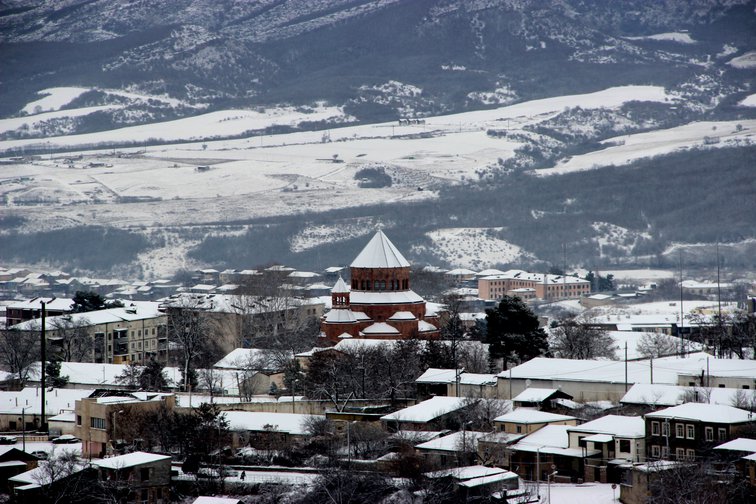
Nagorno-Karabakh: What does the future hold?
18 months on from the 2020 war, people living in the disputed territory tell openDemocracy about their ‘new reality’

Today in Nagorno-Karabakh, the guns are relatively silent. But, 18 months since war brutally redrew the map of control over the disputed territory, those living there remain anxious.
In the morning of 27 September 2020, the capital of Nagorno-Karabakh, Stepanakert, woke to the sounds of cluster munitions exploding. It felt as if the fireworks were continuing from the night before, when the city had celebrated a public holiday. In the 44 days that followed, at least 3,700 Armenian and Karabakh soldiers – many of them young men – were killed in an offensive by Azerbaijani troops seeking to take key positions deep within the territory.
The real death toll is likely higher. Hundreds of Armenian servicemen remain in Azerbaijani captivity today, and the fates of people who went missing are unclear. Tens of thousands of Armenians were displaced, and hundreds of villages were taken under Azerbaijani control. In effect, Nagorno-Karabakh lost 70% of the territory it had controlled since 1994 – and with it, a sense of control over its future. The territory, which is disputed between Armenia and Azerbaijan, is today home to roughly 100,000 Armenians – and is governed by an unrecognised administration.
This “new reality” was confirmed in a 10 November 2020 ceasefire agreement, signed by Armenian prime minister Nikol Pashinyan, Azerbaijani president Ilham Aliyev and Russian president Vladimir Putin. The parties, according to this document, should stay in their currently occupied positions, Azerbaijan received control over the “buffer zone” districts around Nagorno-Karabakh. Prisoner exchange was also envisaged, though it has been painfully slow.
This arrangement was meant to be guaranteed by Russian peacekeeping forces. Nearly 2,000 Russian servicemen were deployed to the territory, with a small armour accompaniment.
Today, these forces control entry to the region via checkpoints on the only direct road that links Nagorno-Karabakh to Armenia proper. It has become nearly impossible for foreign citizens, including tourists and journalists, to visit the territory as a result. This week, Armenian opposition MPs were refused entry to Karabakh by Russian peacekeepers.
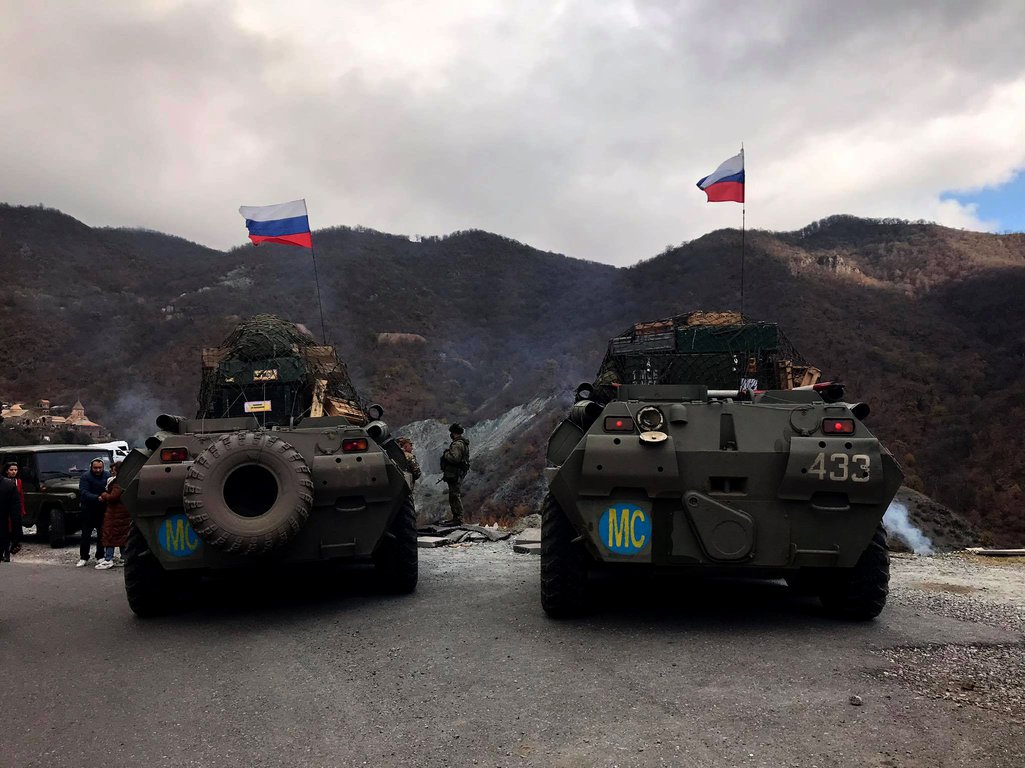
Russian peacekeeping forces in Nagorno-Karabakh
People in Nagorno-Karabakh thought the arrival of Russian forces would stabilise the situation for the next few years but, in reality, stability has proven fleeting. Several incidents in the past month have had a direct impact on people’s lives.
On 8 March, during an unusually cold period, the gas pipeline that passes from Armenia to Karabakh was suspended after being damaged in an area under Azerbaijani control. Karabakh, with its roughly 100,000 residents, has been left without natural gas – meaning no hot food or warm water. As a result, all the kindergartens, schools and universities were closed. Prices of everyday goods in supermarkets have increased, there has been a shortage of bread, and sugar simply disappeared from the stores. Very often the electricity was switched off.
In addition, Azerbaijani forces made incursions into Karabakh territory in March. Near the borders of several villages close to current Azerbaijani positions – Parukh, Khramort and Taghavard – Azerbaijani soldiers began broadcasting menacing speeches in Armenian, calling on residents to abandon their homes and claiming working in their gardens was illegal.
Several days later, Azerbaijani forces began shooting from a grenade launcher, forcing most people to leave their villages. The nearby hill of Karaglukh was taken by Azerbaijani forces, giving them sight lines towards Stepanakert and the nearby town of Askeran. Three soldiers were killed by an Azerbaijani drone in the attack.
Last week, I took the bus to Askeran, just a few kilometres from Parukh and Khramort, to find out what happened. On the journey, which takes 15 or 20 minutes, you pass a major Russian peacekeeping base. Parukh and Khramort are no longer safe to travel to – Khramort is now, in effect, an Armenian military position. I spoke to two people, Alla Arzumanian, who runs a women’s development organisation, and Naira Baghdassarian, who used to live in Khramort.
Shortly after, the authorities in Karabakh called on the Armenian government to abandon its "catastrophic position" in response to signals that it was open to concessions with Azerbaijan.
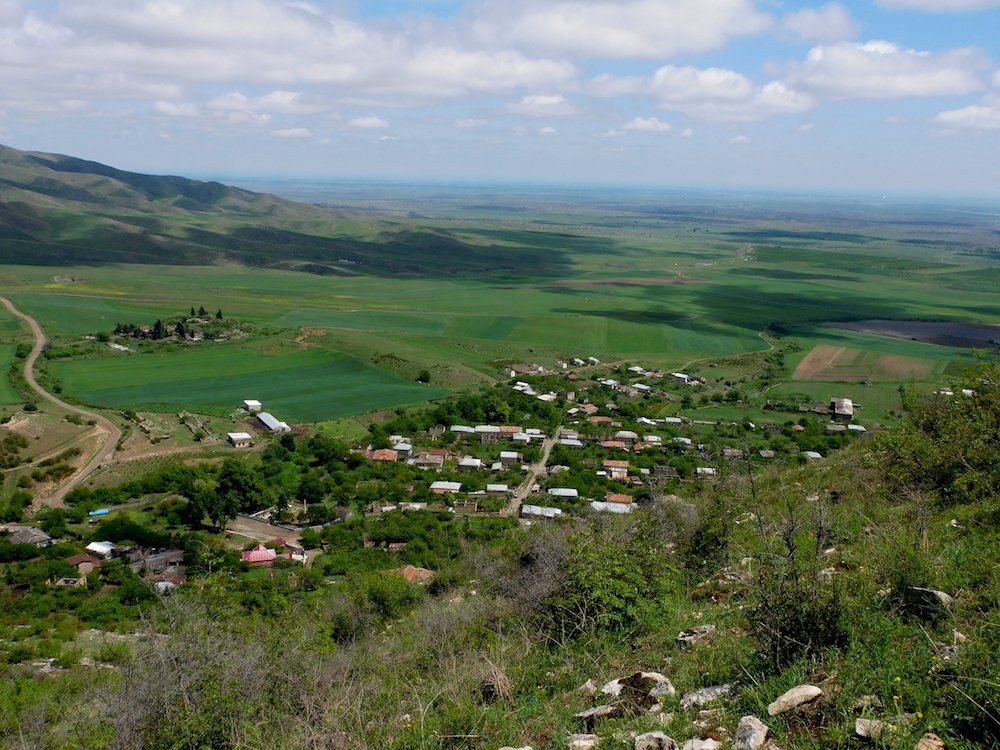
Khramort village
Alla Arzumanian, Askeran
I don’t believe anyone. It feels like everyone is lying. Recently, Azeris from positions near Parukh and Khramort asked us, via megaphones, to abandon our homes. We had a phone call with the head of Khramort village to figure the situation out, he told us everything was fine, there was no need to panic and the village was living its routine life. Then shooting followed. They used a grenade launcher, and a civilian was wounded while working in his garden.
The most interesting thing is that, officially, Baku [the capital of Azerbaijan] rejects all these [incidents], although Azerbaijani themselves started to spread footage via Telegram channels. In response, the Russians say: ‘what can we do when we are not allowed to shoot?’ The Russians call the current situation a ‘mirror retreat’ [meaning that both Armenian and Azerbaijani forces should pull back equally]. What does it mean? That only we must retreat? If you want to hand over territories, just say it clearly. Don’t cheat us with invented terms.
It’s clear that Russia is busy with Ukraine and doesn’t want another problem in Karabakh. Perhaps this is a ‘big game’ which we don’t understand. Although [Khramort and Parukh] are ten kilometres away from us, we heard the news of the displacement by phone. People started to ask around and it turned out to be true. There was an old man who refused to abandon his village [Parukh], but his son, who is in the military, took him out of the village. It became too dangerous to stay.
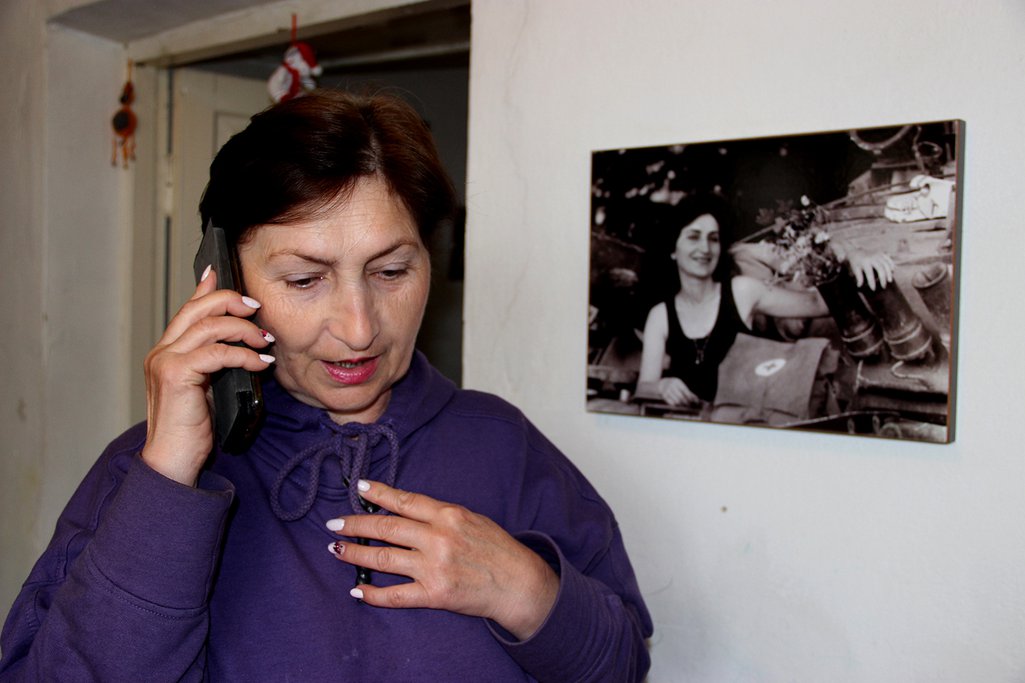
Alla Arzumanian
We are forbidden to take back our villages. About 15 women held a demonstration [in Askeran on 4 April] against Armenian prime minister Nikol Pashinyan – to tell him not to negotiate on our behalf as we didn’t vote for him, so he doesn’t have the right to sign documents for us.
Recently, a campaign was started to collect signatures in support of Karabakh joining Russia. Some part of the population is pro, others are against. If [Karabakh] becomes part of Russia, and that means we have to live with Azeris, then we will disagree. I don’t understand why Armenia didn’t recognise Karabakh’s independence in the past 30 years.
Naira Baghdassaryan, Khramort, Parukh
After the Azerbaijanis started to shoot in the direction of our village and we were displaced, we went to Stepanakert to live with my sister who’s also displaced, from Shushi. Now we have to pay rent.
Even during the 44-day war [in 2020] I didn’t abandon the village. [Back then] I was scared as I lived alone and was frightened as I slept: the Azerbaijanis were 500 metres from my house. I was not so scared by the shooting, but when they played mugham [a traditional Azerbaijani music] via megaphones. That affected me psychologically. Each day I pray to God to send us back home. We sold our cattle and came here.
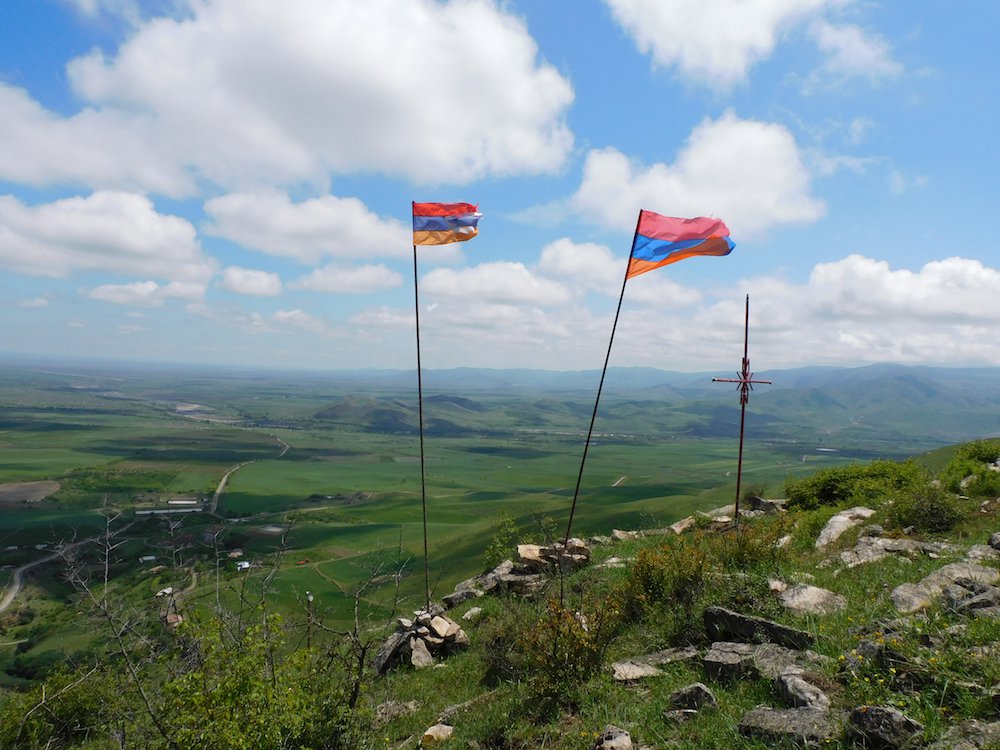
Karaglukh
Now the Azerbaijanis are in Karaglukh, and our village is in the palm of their hand. I was born in Parukh and then moved to Khramort in 1984. I am still hopeful that one day we will visit our ancestor’s graves, our sacred places and light a candle on khachqars [an Armenian memorial stone].
My husband went missing during the 1990s war. I didn’t marry again. We fled to my husband’s village holding my little kid amid heavy snow. How do you walk 80 kilometres?
Back then, our village was burned to embers, the same is happening now. We could stand the former war, this one was even severe. We are hurt by all sides. I don’t rely on people, I rely on God. I want to go home and open the door. Yesterday, I went back home to water the flowers, all the way I was crying, my son said wait until we get home. The garden is blossoming, beans are growing.
Social issues are important, but not of utmost importance. When the gas was off, there were rumours that Azerbaijan could resume the gas flow in return for recognising their territorial integrity. People chose to stay without gas.
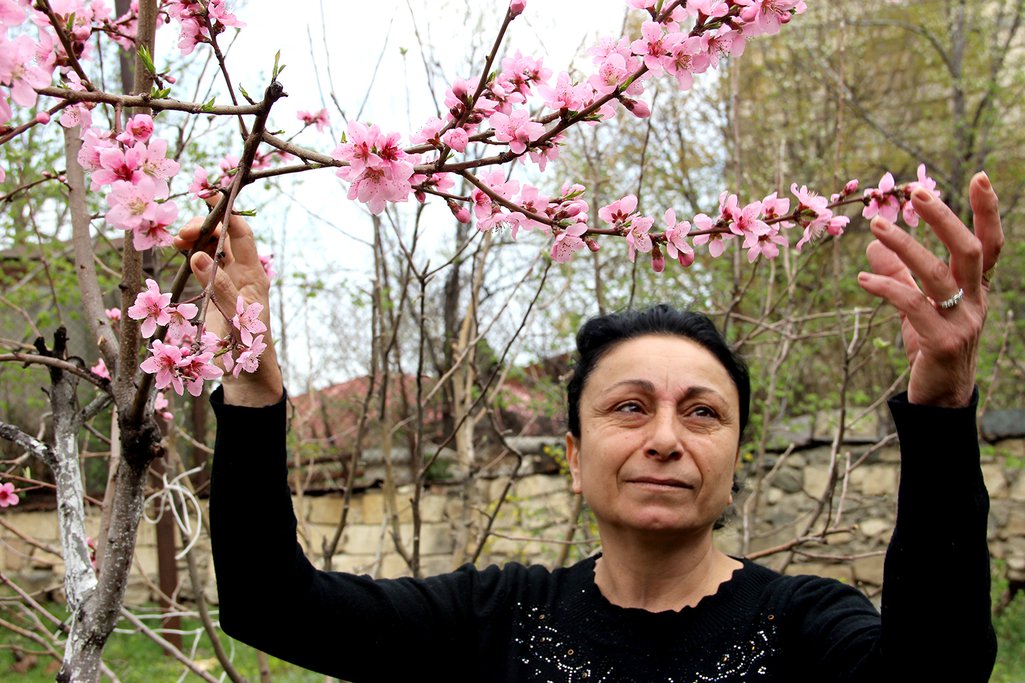
Naira Baghdassaryan
Recently, the former head of Askeran region [Sasun Barsegyan] suggested that we hold a referendum on joining the Russian Federation, which would lead to a secure life for people in Karabakh. Online, people started to dispute this, claiming that our soldiers spilled their blood for rejoining Armenia, not Russia. But I should say that the number of people who want to join Russia is no less. The question is whether Russia sees Karabakh as a part of it.
The Parukh incident also made its mark on Russia’s reputation: the Azerbaijanis entered the village in the presence of the Russians. Moreover, it was almost clearly stated that the Russians handed the village over to the Azeris. After that the government of Karabakh applied to the Armenian government to act as a security guarantor for people in Karabakh. Armenia hasn’t sent its response yet.
Read more
Get our weekly email
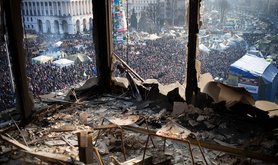
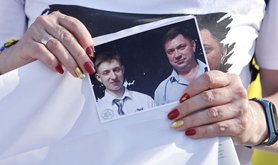

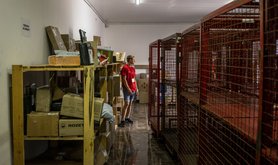
Comments
We encourage anyone to comment, please consult the oD commenting guidelines if you have any questions.